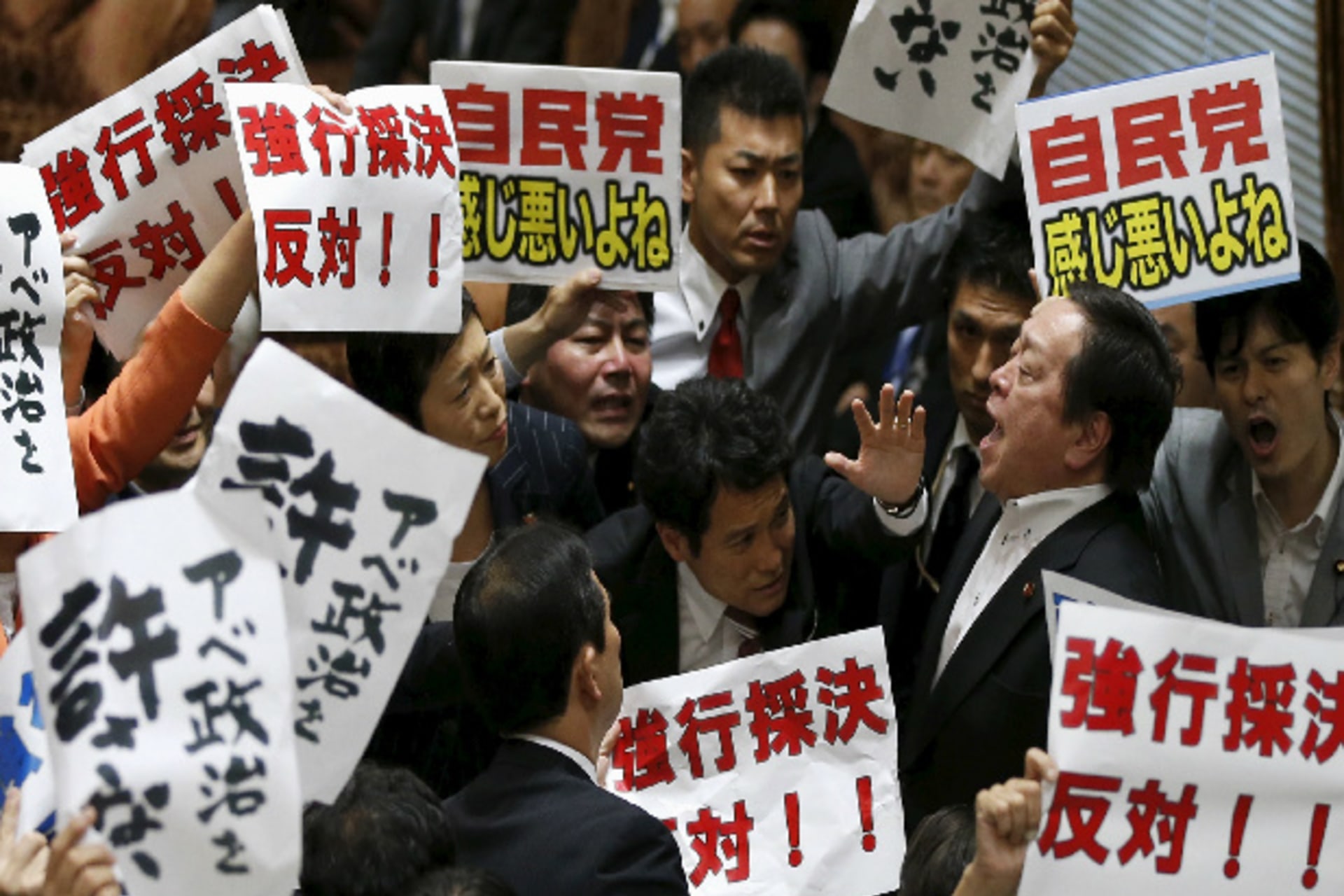Japan’s Diet Uproar

By experts and staff
- Published
Experts
![]() By Sheila A. SmithJohn E. Merow Senior Fellow for Asia-Pacific Studies
By Sheila A. SmithJohn E. Merow Senior Fellow for Asia-Pacific Studies
Committee deliberations on the Abe cabinet’s new security legislation erupted into a spectacle of contention today as the ruling coalition used their majority to move their bill to the floor of the Diet’s Lower House. Opposition members rushed the dais of the special committee chairman, Yasukazu Hamada, calling for an end to “Abe politics” and accusing the Liberal Democratic Party (LDP)-Komeito coalition of ramming through legislation that the Japanese people do not support.
In a press conference after the vote, Prime Minister Shinzo Abe himself acknowledged that he has not succeeded in gaining the public’s understanding for a legislative package that would allow Japan’s military greater latitude to work alongside others. In a cabinet decision last July, the prime minister announced he would change the government’s interpretation of the constitution to allow for the right of collective self-defense. Implementing legislation, presented to the Diet last month, allows the Self Defense Force (SDF) to operate in concert with the United States and other forces to “protect the lives of the Japanese people and the survival of Japanese nation.” On June 22, Abe extended the Diet session to September 27 to ensure passage of the new laws.
In practical terms, the Abe government was seeking to clarify the legal basis for three types of military operations. The first was operations providing for Japan’s own security, largely designed to improve the ability of U.S. and Japanese militaries to plan for a variety of contingencies. The second was to allow the SDF to provide logistical support to others who were fighting elsewhere if that conflict threatened Japanese security interests. Included was the provision of ammunition and fuel to the U.S. military during a conflict. Finally, the legislation clarified the ability of the SDF to participate in coalition efforts, including those sponsored by the United Nations, in humanitarian and disaster relief. In short, none of the contingencies publicly presented here involved scenarios that Japan has not confronted to date.
This legislation is critical to the implementation of recently concluded U.S.-Japan defense cooperation guidelines. Indeed, part of the political challenge for Abe was his public promise to the U.S. Congress that he would get the laws passed. Coming back to Tokyo, Abe faced an incensed opposition in the Diet that claimed he had no right to commit to Washington before they had time to deliberate his government’s bill.
Criticism of Abe’s agenda only worsened from there. On June 4, the Lower House special committee convened to deliberate the bill called in three constitutional scholars. To the amazement of all, the expert called by the ruling LDP, Yasuo Hasebe of Waseda University, testified that the Abe cabinet’s 2014 decision to reinterpret the constitution was in fact unconstitutional.
Hasebe’s testimony lit a smoldering fire of protest. Constitutional scholars and other legal communities convened public meetings, and across Japan, local assemblies passed resolutions in protest to the Abe cabinet’s position on collective self-defense. A total of 9,766 Japanese scholars, artists and other public intellectuals, including Nobel laureate Toshihide Masukawa, signed a petition opposing the new security legislation. As the deliberations in the Diet continued, protestors took to the streets outside with “no war” and anti-Abe slogans on their placards. On July 12, about 750 members of Gambare Nippon!, a conservative activist group, lodged a counter protest. The following night, two hundred supporters of Article Nine responded, and then on the evening of July 14, the media reported twenty thousand protesters including students, NPO groups, and older Japanese gathered in Hibiya Park to demonstrate their opposition to the new bill.
Inside the Diet, Japan’s new legislative balance was on full display. Opposition parties, including the Democratic Party of Japan (DPJ), the Japan Communist Party (JCP), and the much smaller parties (including the Social Democratic Party, the People’s Life Party and Taro Yamamoto and Friends) all stood against the security bill. But the focus was on what the new Japan Innovation Party (JIP) would do. Many thought the JIP would align with the ruling coalition in support of the legislation, but ultimately the party president, Yorihisa Matsuno, rejected the government bill, and instead offered up his own parliamentary bill on July 8.
The JIP bill, with some support from the former ruling party, the DPJ, took on the core principles of the Abe cabinet’s legislation. Two were obvious deal breakers: first, the JIP bill rejected the need for a reinterpretation of the right of collective self-defense, instead relying on the existing right of self-defense inherent in the SDF’s established missions; and second, the JIP bill also rejected the idea that the SDF should be deployed anywhere near an area where combat was taking place. In short, committee deliberations revealed there was little room for compromise between the ruling coalition and the JIP-led counterproposal. Today’s committee passage of the government bill thus ended Abe’s short-lived effort at seeking compromise.
Tomorrow the ruling coalition will call a full vote in the Lower House, using its majority to conclude this first round of the Lower House deliberation. From there, the bill will move to the Upper House, which has sixty days to deliberate before taking its own vote. The ruling coalition has a majority in the House of Councillors, with 133 of 242 seats, but may need the cooperation of smaller opposition parties to gain the necessary votes for it to pass. With the JIP now firmly against the government’s version, it is likely that the bill will return to the Lower House for passage. All of this must be complete by the new September 27 deadline for the current Diet session. Today’s vote to move the bill out of the committee demonstrates that the Abe cabinet plans to use its supra majority to conclude the process. As tempers flare in this first round of committee deliberations, however, there is some concern within the LDP that this could take a political toll as they look ahead to the fall and to the next Upper House election next summer.
This summer will test the LDP and its coalition partner, the Komeito, whose supporters seem more at ease with the sentiment of the opposition than with the LDP. The prime minister’s support rating has been dropping by the week, and today it falls two points lower than his disapproval rating. Abe has faced this drop in polling before when he pursued a new government secrecy law in late 2013 and when his cabinet announced the new policy on collective self-defense last summer. Opposition parties were vociferous in their criticism then, and media commentary warned of the need for consensus and popular support.
But this time feels different. Citizen activism against the prime minister’s policies is spreading, and on the streets and in town halls across Japan, there is a push to build a coalition of opposition to Abe’s effort at defense policy reform. Abe’s leadership has been questioned largely by his critics but now increasingly by members of his own party. The NHK, Japan’s public broadcasting station, and the Yomiuri Shimbun, a strong supporter of the new security legislation, report in their polling that the majority of Japanese believe the discussion on this critical policy change is insufficient, noting 56 percent and 80 percent of their respondents, respectively, felt dissatisfied. Today’s Diet drama is just the first of many steps in the two months of Diet debate to go. There is plenty of time for this newfound appetite for opposition to the Abe government to grow.
It is too early to tell if this political fracas will have a lasting impact on Abe’s political capital. Additional hurdles between now and the end of September are politically sensitive for the Abe government. The government remains locked into a standoff with the Governor of Okinawa Prefecture over a new base for the U.S. Marines there, with construction expected to begin in August-September. Another flare-up with Seoul over the UNESCO world heritage sites has also prompted backlash against the government. In addition, the prime minister will issue his much anticipated statement on August 15 commemorating the seventieth anniversary of the end of World War II. Ironically his success in rekindling diplomacy with Beijing may also be playing into the domestic debate over Japan’s military preparedness.
A protracted contest over Japan’s defense reforms weakens the prime minister’s hand. Having publicly promised the United States that he will complete the legislation, Abe will be hard pressed to step back. But a deeply divided Japanese public over alliance cooperation is not the outcome U.S. policymakers hoped for. Moreover, there is a growing agenda for maritime cooperation in Asia, even as both Washington and Tokyo seek to reduce the risk of inadvertent clashes between their militaries and China’s People’s Liberation Army (PLA). Abe is reportedly considering a visit to China in September to meet with Xi Jinping, after the Chinese president hosts his own commemoration of Japan’s defeat and end of the war on the continent on September 3 but before Xi arrives in Washington later in the month.
The Diet uproar signals a tough road ahead for Japan’s prime minister. Abe must be aware that some of the decisions he has taken would promote controversy, but he has in many ways styled himself after his grandfather, former Prime Minister Nobusuke Kishi, who did not step back from domestic opposition when it came time to revise the U.S.-Japan security treaty over half a century ago.
But today’s strategic quandary for Japan is far different than the late 1950s, and popular sentiment about Japan’s own military option is far more complex. As his diplomatic skills are tested in the months ahead, so too will be Abe’s ability to gauge domestic sentiment on Japan’s military and its constitution. If he pushes too far, too fast, the backlash could seriously impair Japan’s ability to provide for its security in a rapidly changing Asia. On the other hand, stepping back from the defense agenda he has nurtured so carefully could complicate his ability to promote the array of other reforms he has proposed. At the very least, Abe must regain his public’s confidence if he is to complete his task.
